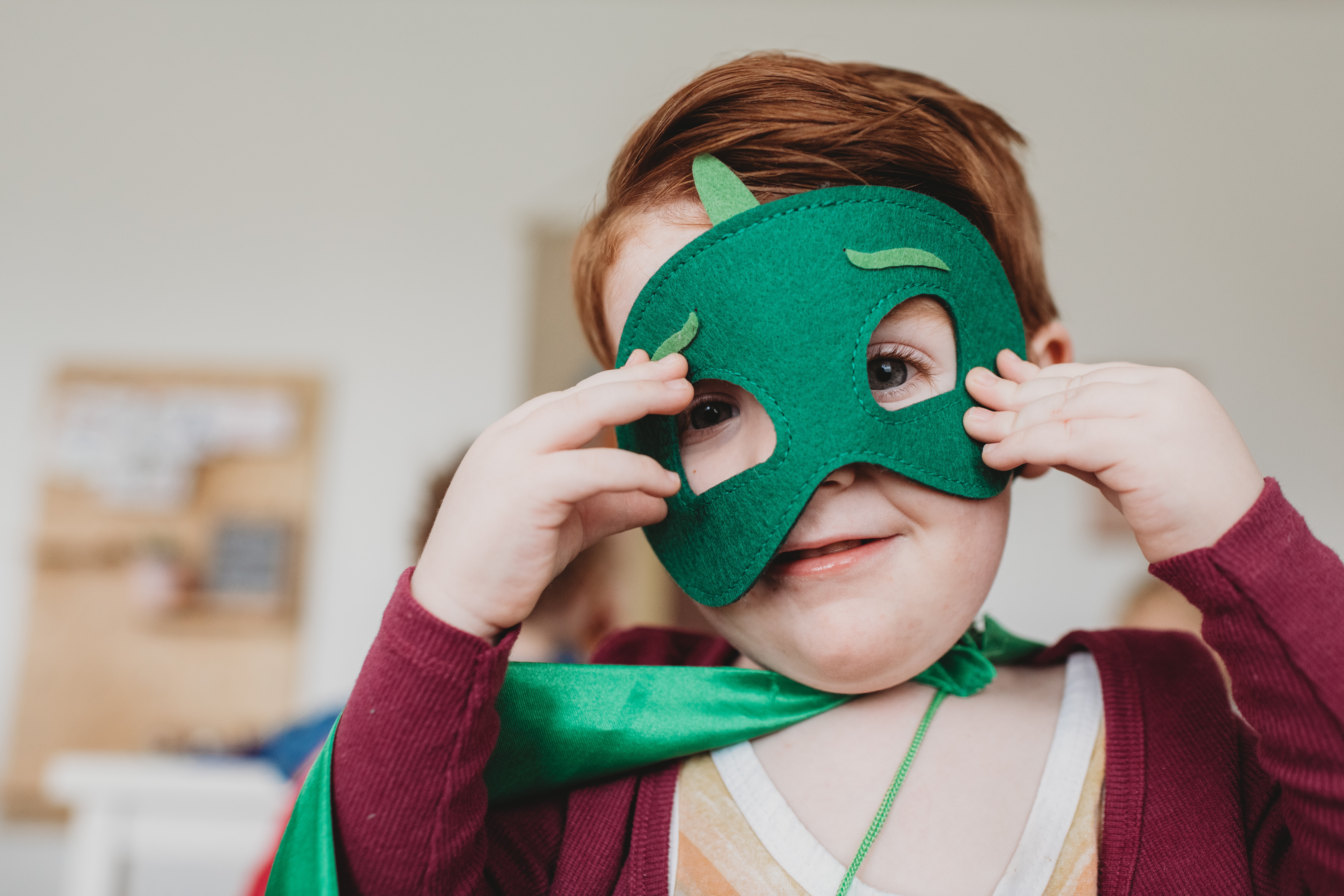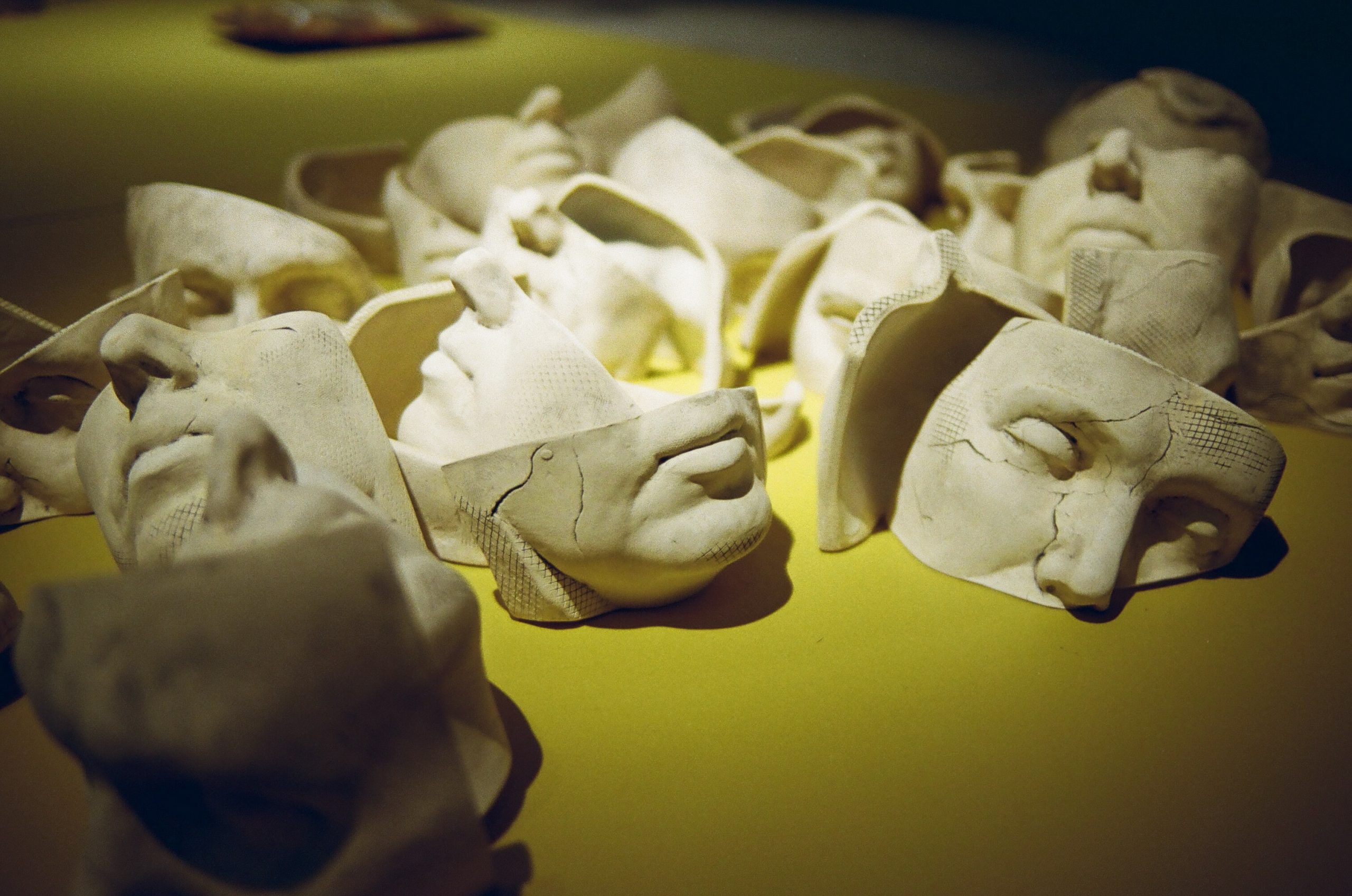The origin of the word hypocrisy is from the Greeks who defined it as “playing a part on the stage.” So, in effect all actors are hypocrites. The truth is all of us have at one time or another projected an image of ourselves that is different from who we really are. For most of us wearing a mask is borne out of necessity: we feel the need to cover up for our insecurities or we assume an alternate identity so we can be accepted and gain the approval of others.

At some early point in life (usually around age 7), you became self-conscious (having an awareness of your individual existence). What soon follows is a comparative awareness of who you are in relationship to others. This usually holds a heightened, hyper-awareness of your appearance and actions. Remember those days when it seemed that everyone saw everything you did that was goofy, stupid, and clumsy? An unhealthy self-consciousness can lead you to actions where you shift your behaviors and even your appearance to please the expectations and preferences of others. This is mask-wearing, and a lot of people resort to it as an attempt to hide what they believe others would judge as unwanted or unattractive. Sadly, many people stay in this mask-wearing mode for the remainder of their lives. They become approval addicts and continually present false images to mask their insecurities.
Lost in False Identities
Contentment with who you (really) are, is vital to your psychological health. The loss of this contentment with self is core to a broadly held concern over the negative impact of social media on the psyche of teens and preteens. To be honest, I find myself giving unhealthy attention to the comments, likes, and emojis that show up below my posts. The attention I give to editing and re-editing a post to create an upgraded persona should be all the evidence I need to recognize my mask wearing. In the moment, however, that evidence is neatly concealed behind just “wanting to get the wording right…” I’m sure I’m not the only “should-be-comfortable-in-my-own-skin-by-now” adult that does this social-media approval seeking.
It’s alarmingly easy to lose your primary identity by wearing different masks around different groups of people. Through the years I’ve asked hundreds of people a simple question, “What is it that you want?” They seem to understand what their parents want, what an advisor wants, what their friends want them to do, or what their partner or spouse wants, but they don’t know what they want. I’ve been repeatedly surprised at how detached people can become from who they are and want as an individual. Their true self is regularly hidden behind masks created from the expectations, needs and opinions of others.
Playing a Role that Defines Your Life
Stage actors must deeply concentrate to keep up their imitated British accent on every word they speak or remember to limp on their left leg after a fake injury. They are maintaining an illusion for the audience and a break in their character reminds everyone that this is just a play; it’s not real.
It takes a ton of energy to stay in the character your insecurity-hiding or approval-seeking mask is projecting. But it’s not just tapping the energy required to keep up appearances. It’s also depleting the precious energy that’s necessary for being your true self. When I was maybe 12 or 13, a kid in my neighborhood got two pairs of boxing gloves for Christmas. A few of us were out in his front yard enjoying the winter break from school, so he brought out the gloves for some fun. My turn in the ring came and knowing nothing about boxing I promptly engaged in vigorous swinging and flailing. After about 60 seconds of that activity my arms felt like they weighed about 200 pounds each. My opponent, who had been unharmed by my flailing and had bounced around on the grass waiting for me to gas out, stepped in and punched me repeatedly right in the face. I wanted with everything within me to cover my face and block the beating, but I couldn’t even raise my arms to defend myself. I ended up collapsing to the ground and yelling, “You win… you win!” I’ve seen a lot of people similarly gas out. They make such frantic efforts to maintain an image that when they have a moment of self-reflection or an opportunity to be truthful, they have nothing left in their mental and emotional capacity to stand up and be themselves. It takes a lot of energy to cultivate self-honesty, develop healthy self-appreciation, and find internal satisfaction in what you do and the person you are as you do it.
Here are three suggestions on ways to come out from behind your masks:

Work on Owning Who You Are: Identity discovery is not a two-hour activity. It will take time to figure out the you that you are. The good news is as you move forward and see yourself more clearly, it allows you to define yourself apart from masks you have been wearing. It’s vital that you are honest with yourself. When I honestly accepted that I am hardwired as an introvert, but professionally called upon to function as an extravert, I was able to stop pretending to enjoy every social setting into which I was invited. I still did my job but declined about 30% of the invitations I was given because they were only serving the extraverted mask. I also gave myself greater permission to recover between the demands of social settings, carving out time to be alone. I gained the confidence to be honest with people about my nature; describing to them what drains me and what replenishes me. You may want to take a couple of personality inventories and instead of focusing on the higher scores, examine mid-range scores. They might be pointing to areas of your personality that are truer to the person you really are but are being eclipsed by traits formed from a functional necessity or cultural-relational expectations.
Watch for the Feeling of Insecurity and Choose to Act Authentically: One of the primary triggers for mask-wearing is insecurity. We want to be perceived as having it together, being confident, smart, important, and valuable. When any of those areas are jeopardized, we grab the mask that we think will fortify that desired image. If you catch the rising feeling of insecurity early, you can decide to act differently before the emotional bottom falls out and you find yourself in an emotional freefall. By acting early, you can decide to act authentically.
The key to that authenticity is developing healthy self-appreciation. This is obviously different than being self-centered. Self-appreciation comes from having a realistic understanding of both the strengths and weaknesses of your primary personality. That understanding allows you to create provisions for your weaknesses and excel in areas where you are strong. Everyone is insecure about something. It’s partly the consequence of striving for standards of perfection in a society that celebrates cynics, skeptics, and critics. You will never be perfect enough to impress them, no matter how hard you pretend. Your best bet is to be happily, authentically, and imperfectly you.

Adjust the Scales of Approval: The other primary trigger for mask-wearing is approval. Every human being has a need to be noticed, valued for who they are, and appreciated. We regularly look to others to find that esteem and approval, and there is nothing wrong with this so long as there is a healthy balance between the esteem of people and your self-esteem. Some portion of your self-esteem must come from your sense of purpose, and satisfaction with what you do and who you are. This calls for some evaluation of the benefit your life brings to others. Finding an opportunity to serve the needs of marginalized people or helping those in unfortunate situations can elevate your personal satisfaction index exponentially.
Make some adjustments to the activities of your life ensuring that they contribute to your meaningful purpose and then draw a greater sense of personal approval from there. Focusing on the merit of the things you do and the way you are as you do them produces a lot of positive weight on the approval scale. In other words, drawing internal value and meaning from your life purpose will lessen your need for external sources of approval. The shallowest people in our society are those who are obsessively image-casting and constantly trolling for compliments. Their low self-esteem is creating a cavernous, insatiable need for the attention and approval of others… and there is no limit on what they will do to gain it.
For some people, the container that represents their need for approval from others is very deep and broken. If you find that you are unable to satisfy this need through normal relationships, meaningful purpose, or your varied roles and activities, you may need to spend some time with a good therapist. Incomplete grief from the experience of loss, being cut off from healthy interactions with parents at a critical time of childhood development, or other life traumas can create fractures in our souls where normal amounts of approval drain out like water in a cracked pitcher. Get some outside help for that inside damage if you find yourself unable to feel fully affirmed.
Conclusion:
Lynn Breedlove is quoted as saying, “I learned in High School, if I hold up an effigy, a mask or a lie, that mask will get all the love, not me.” This is the true cruelty of pretending and hiding behind an image that’s not really you. The affection, respect and affirmation are received not by you, but by a fabricated image; something you are pretending to be. The result is hollow and empty. You lose yourself behind the mask, and you are unable to receive the approval given to the mask because the mask is not really you.
There is a better way to live. Get honest with yourself. Get honest with a helping friend, coach, or a counselor. Be content with the person you truly are and over time you will gain the confidence that follows the contentment. You are who you are and that is more than enough for the road you are meant to travel. Leave the masks to silly parties or Halloween and get on with YOUR life.

